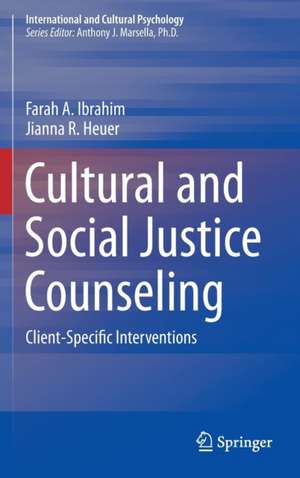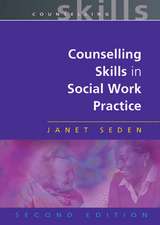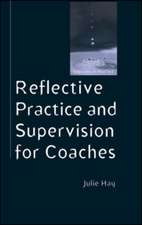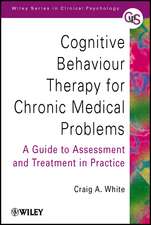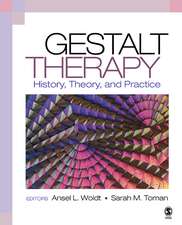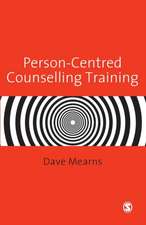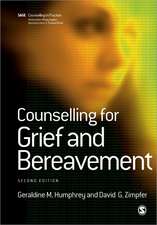Cultural and Social Justice Counseling: Client-Specific Interventions: International and Cultural Psychology
Autor Farah A. Ibrahim, Jianna R. Heueren Limba Engleză Hardback – 3 sep 2015
Among the topics covered:
- Cultural identity: components and assessment.
- Worldview: implications for culturally responsive and ethical practice.
- Understanding acculturation and its use in counseling and psychotherapy.
- Social justice variables critical for conducting counseling and psychotherapy.
- Immigrants: identity development and counseling issues.
- Designing interventions using the social justice and cultural responsiveness model.
| Toate formatele și edițiile | Preț | Express |
|---|---|---|
| Paperback (1) | 387.58 lei 6-8 săpt. | |
| Springer International Publishing – 23 aug 2016 | 387.58 lei 6-8 săpt. | |
| Hardback (1) | 476.75 lei 6-8 săpt. | |
| Springer International Publishing – 3 sep 2015 | 476.75 lei 6-8 săpt. |
Din seria International and Cultural Psychology
- 18%
 Preț: 1117.03 lei
Preț: 1117.03 lei - 17%
 Preț: 490.68 lei
Preț: 490.68 lei - 15%
 Preț: 587.02 lei
Preț: 587.02 lei - 15%
 Preț: 647.40 lei
Preț: 647.40 lei - 5%
 Preț: 718.10 lei
Preț: 718.10 lei - 24%
 Preț: 797.39 lei
Preț: 797.39 lei - 20%
 Preț: 564.52 lei
Preț: 564.52 lei - 18%
 Preț: 1693.62 lei
Preț: 1693.62 lei - 18%
 Preț: 1010.48 lei
Preț: 1010.48 lei - 18%
 Preț: 784.13 lei
Preț: 784.13 lei - 18%
 Preț: 780.52 lei
Preț: 780.52 lei - 18%
 Preț: 946.24 lei
Preț: 946.24 lei - 15%
 Preț: 641.85 lei
Preț: 641.85 lei - 18%
 Preț: 952.57 lei
Preț: 952.57 lei - 5%
 Preț: 1031.68 lei
Preț: 1031.68 lei - 15%
 Preț: 637.13 lei
Preț: 637.13 lei - 5%
 Preț: 708.78 lei
Preț: 708.78 lei - 18%
 Preț: 1120.18 lei
Preț: 1120.18 lei - 15%
 Preț: 638.76 lei
Preț: 638.76 lei - 20%
 Preț: 556.10 lei
Preț: 556.10 lei - 15%
 Preț: 700.10 lei
Preț: 700.10 lei - 15%
 Preț: 697.94 lei
Preț: 697.94 lei - 5%
 Preț: 1095.90 lei
Preț: 1095.90 lei - 18%
 Preț: 999.94 lei
Preț: 999.94 lei - 24%
 Preț: 842.28 lei
Preț: 842.28 lei - 15%
 Preț: 646.62 lei
Preț: 646.62 lei - 18%
 Preț: 947.95 lei
Preț: 947.95 lei - 18%
 Preț: 892.74 lei
Preț: 892.74 lei - 5%
 Preț: 1098.27 lei
Preț: 1098.27 lei - 20%
 Preț: 552.45 lei
Preț: 552.45 lei - 15%
 Preț: 649.54 lei
Preț: 649.54 lei - 18%
 Preț: 785.55 lei
Preț: 785.55 lei - 18%
 Preț: 947.67 lei
Preț: 947.67 lei - 18%
 Preț: 947.98 lei
Preț: 947.98 lei - 18%
 Preț: 952.26 lei
Preț: 952.26 lei
Preț: 476.75 lei
Preț vechi: 560.89 lei
-15% Nou
Puncte Express: 715
Preț estimativ în valută:
91.22€ • 95.25$ • 75.33£
91.22€ • 95.25$ • 75.33£
Carte tipărită la comandă
Livrare economică 15-29 aprilie
Preluare comenzi: 021 569.72.76
Specificații
ISBN-13: 9783319180564
ISBN-10: 3319180568
Pagini: 400
Ilustrații: XXVIII, 256 p.
Dimensiuni: 155 x 235 x 22 mm
Greutate: 0.58 kg
Ediția:1st ed. 2016
Editura: Springer International Publishing
Colecția Springer
Seria International and Cultural Psychology
Locul publicării:Cham, Switzerland
ISBN-10: 3319180568
Pagini: 400
Ilustrații: XXVIII, 256 p.
Dimensiuni: 155 x 235 x 22 mm
Greutate: 0.58 kg
Ediția:1st ed. 2016
Editura: Springer International Publishing
Colecția Springer
Seria International and Cultural Psychology
Locul publicării:Cham, Switzerland
Public țintă
Professional/practitionerCuprins
Social Justice and Cultural Responsiveness in Counseling.- Cultural identity: Components and Assessment.- Worldview: Implications for Culturally Responsive and Ethical Practice.- Understanding Acculturation and its Use in Counseling and Psychotherapy.-Incorporating Social Justice and Advocacy in Counseling and Psychotherapy.- Immigrants: Identity Development and Counseling Issues.- Refugees, Adaptation, Psychological Interventions, and Identity Development.- Application of Social Justice and Cultural Responsiveness Strategies.- Appendix A: Cultural Identity Checklist-Revised.- Appendix B: Scale to Assess Worldview.- Appendix C: United States Acculturation Index.
Recenzii
“Ibrahim and Heuer’s edited book … will help psychologists and other mental health professionals obtain this necessary understanding and skill. … book assists with practical tips on how this can be achieved, further enabling the clinician to better meet the needs of his or her clients … . It ushers our profession to a sense of responsibility, in an informative and insightful way, reminding us that we have a special responsibility to those who are oppressed because they are different.” (Rehman Y. Abdulrehman, PsycCRITIQUES, Vol. 61 (36), September, 2016)
Notă biografică
Farah Ibrahim is a fellow of the American Psychological Association (Society for Counseling Psychology) and a licensed psychologist (CT, DC, CO). She is past president of Counselors for Social Justice (2002-3) a division of the American Counseling Association. She has served at the University of Connecticut, Howard University, and as Chair of Teacher and Counselor Education at Oregon State University as a tenured full professor. She is currently serving as full professor in the School of Education and Human Development at the University of Colorado Denver. She is the author of the Existential Worldview theory and is the developer of the following instruments: Scale to Assess Worldview© with Harris Kahn, the “Cultural Identity Check List©” (Ibrahim, 1990, 2007) the “Cultural Competence Survey©” (Ibrahim, 2005), and the United States Acculturation Index© (Ibrahim, 2008). She has conducted research on worldview and training for cultural effectiveness, gender and worldview, organizational culture and worldview, identity development, South Asian identity issues, trauma and Post Traumatic Stress Disorder (PTSD) due to oppression, and infusion of social justice and cultural competencies in counseling curricula. Her latest research has focused on counseling Muslims in the West. She has a video on “Counseling Muslims” marketed by Microtraining Associates. She has assisted with several grant projects as a consultant or as co-principal investigator focusing on cultural competence training, effect of domestic violence on children and adolescents, and intergenerational trauma and its impact and health and mental health. Her current research interests are cultural competence and social justice training, cross-cultural research on worldviews, assessment in cross-cultural settings, identity development in a diverse society, Counseling South Asian immigrants and international students, and alleviation, and elimination of trauma and violence in society, social justice and cultural competence in group work.
Jianna R. Heuer, has a Master’s degree in Social Work form New York University. She currently serves as a part-time counselor for students with disabilities at LaGuardia Community College. Her research interests focus on cultural responsiveness and social justice concerns. She also maintains a private practice in New York City where she focuses on college coaching as well as relationship issues, trauma, disability issues, anxiety, and depression.
Jianna R. Heuer, has a Master’s degree in Social Work form New York University. She currently serves as a part-time counselor for students with disabilities at LaGuardia Community College. Her research interests focus on cultural responsiveness and social justice concerns. She also maintains a private practice in New York City where she focuses on college coaching as well as relationship issues, trauma, disability issues, anxiety, and depression.
Textul de pe ultima copertă
This timely volume gives readers a robust framework and innovative tools for incorporating clients' unique cultural variables in counseling and therapy. Its chapters identify cultural, societal, and worldview-based contexts for understanding clients, from the relatively familiar (ethnicity, gender, age) to the less explored (migration status, social privilege, geographic environment). Diverse cases illustrate how cultural assessments contribute to building the therapeutic relationship and developing interventions that respect client individuality as well as group identity. In these pages, clinicians are offered effective strategies for conducting more relevant and meaningful therapy, resulting in better outcomes for client populations that have traditionally been marginalized and underserved. The appendices include the Scale to Assess Worldview© (Ibrahim & Kahn, 1984), The Acculturation Index© (Ibrahim, 2008), and the Cultural Identity Check List-Revised© (Ibrahim, 2007).
Among the topics covered:
Among the topics covered:
- Cultural identity: components and assessment.
- Worldview: implications for culturally responsive and ethical practice.
- Understanding acculturation and its use in counseling and psychotherapy.
- Social justice variables critical for conducting counseling and psychotherapy.
- Immigrants: identity development and counseling issues.
- Designing interventions using the social justice and cultural responsiveness model.
Caracteristici
Provides guidelines for assessment of cultural identity, worldview, and acculturation status Provides a model for immigrant and refugee identity development in host culture Increases cultural awareness and knowledge Includes supplementary material: sn.pub/extras
